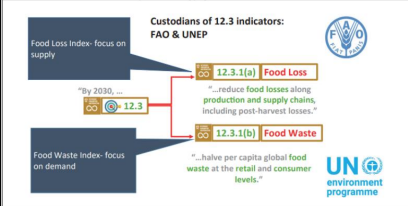Ahmedabad
(Head Office)Address : 506, 3rd EYE THREE (III), Opp. Induben Khakhrawala, Girish Cold Drink Cross Road, CG Road, Navrangpura, Ahmedabad, 380009.
Mobile : 8469231587 / 9586028957
Telephone : 079-40098991
E-mail: dics.upsc@gmail.com

News: The Food Waste Index Report 2024, published by the United Nations Environment Programme (UNEP), sheds light on the global issue of food waste.
Key Findings:
Magnitude of Food Waste
Approximately 19% of all food produced worldwide in 2022 was wasted, amounting to around 1.05 billion metric tons.
Each person, on average, wasted 79 kg of food annually in households globally, compared to 55 kg per capita per year in India
Expanded Data Points
The report incorporates vastly expanded data points from around the world, providing significantly more robust global and national estimates.
Enhanced measurement guidance
The report expands on the SDG 12.3 food waste measurement methodology introduced in the 2021 report.
It offers enhanced guidance on measurement across retail, food service, and household sectors.
Other key Findings:
Out of the total food wasted in 2022, 60% happened at the household level,
with food services responsible for 28%, and retail 12%.
It was found that food waste is not a “rich country problem”. Difference between average levels of household food waste for high-income, upper-middle, and lower-middle-income countries, was just 7 kg per capita.
Hotter countries appear to generate more food waste per capita in households. It is potentially due to higher consumption of fresh foods with substantial inedible parts and a lack of robust cold chains.
Transition to Solutions
Unlike previous reports that focused solely on measurement, the 2024 report explores solutions for food waste reduction.
It examines effective approaches globally, with a spotlight on public-private partnerships
What are some effective strategies to reduce food waste at the household level?
Meal Planning: Plan your meals for the week and create a shopping list accordingly. This helps you buy only what you need and avoid impulse purchases
Portion Control: Cook the right amount of food to prevent leftovers from going to waste. Be mindful of portion sizes to minimize excess food.
Use Leftovers Creatively: Repurpose leftovers into new meals. Get creative!
Optimal Storage: Learn how to store different foods properly: Keep perishables in the fridge. Use airtight containers to prevent spoilage. Store fruits and vegetables separately to avoid premature ripening.

Address : 506, 3rd EYE THREE (III), Opp. Induben Khakhrawala, Girish Cold Drink Cross Road, CG Road, Navrangpura, Ahmedabad, 380009.
Mobile : 8469231587 / 9586028957
Telephone : 079-40098991
E-mail: dics.upsc@gmail.com
Address: A-306, The Landmark, Urjanagar-1, Opp. Spicy Street, Kudasan – Por Road, Kudasan, Gandhinagar – 382421
Mobile : 9723832444 / 9723932444
E-mail: dics.gnagar@gmail.com
Address: 2nd Floor, 9 Shivali Society, L&T Circle, opp. Ratri Bazar, Karelibaugh, Vadodara, 390018
Mobile : 9725692037 / 9725692054
E-mail: dics.vadodara@gmail.com
Address: 403, Raj Victoria, Opp. Pal Walkway, Near Galaxy Circle, Pal, Surat-394510
Mobile : 8401031583 / 8401031587
E-mail: dics.surat@gmail.com
Address: 303,305 K 158 Complex Above Magson, Sindhubhavan Road Ahmedabad-380059
Mobile : 9974751177 / 8469231587
E-mail: dicssbr@gmail.com
Address: 57/17, 2nd Floor, Old Rajinder Nagar Market, Bada Bazaar Marg, Delhi-60
Mobile : 9104830862 / 9104830865
E-mail: dics.newdelhi@gmail.com